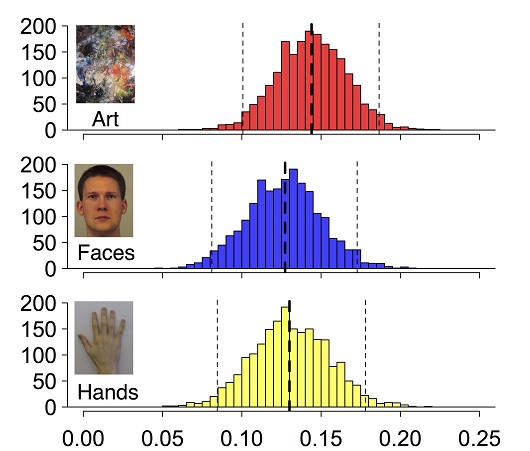Mate-choice copying in humans – are all the taken men good?

A new study by researchers from the Universities of St Andrews, Durham, Exeter and Arizona State finds that men get an ‘attractiveness boost’ from being chosen by others – but so do abstract works of art.
The study, led by Dr Kate Cross from the School of Psychology and Neuroscience at the University of St Andrews, published in Scientific Reports today (29 January), casts doubt on the theory that evolution favoured women who were attracted to other women’s partners.
Mate-choice copying is a tendency to find potential partners more attractive when they have already been chosen as a partner by someone else. Many species of bird and fish show mate-choice copying, which helps females to select high-quality males as sexual partners and therefore provides an evolutionary advantage.
Some high-profile studies have appeared to show mate-choice copying in humans. The theory is that women are especially attracted to men who are already partnered because they can be assumed to be kind and faithful – which makes them ‘good mates’. However, previous evidence has been thrown into question by the new study, which showed that women also copy the choices of others when asked about the attractiveness of other types of stimuli such as art.

Social influence by condition (Street et al 2017)
Dr Cross, lead author of the study, said: “Women in our study found men’s faces more attractive if other women had given that face high ratings. But the same goes for pictures of abstract artworks. Women appear to copy the mate preferences of other women, but this might simply be because humans have a general tendency to be influenced by the opinions of others.”
The study also showed that including lesbian and bisexual women in the experiment didn’t change the results – which suggests that women are influenced the same way, whether or not they view men as potential partners.
Joint author of the paper, Dr Sally Street, Assistant Professor from the Department of Anthropology, Durham University, said: “Social influence affects every area of our lives, and this could include partner choice. But there isn’t, at the moment, clear experimental evidence of a specialised mate-choice copying mechanism in humans.”
When making judgements about attractiveness, it seems the opinions of other people matter, regardless of who, or what, is being judged.
The paper ‘Mate-choice copying is domain-general social learning’ is published in the journal Scientific Reports today (29 January) and is available online.
Please ensure that the paper’s DOI (http://dx.doi.org/10.1038/s41598-018-19770-8) is included in all online stories and social media posts, and that Scientific Reports is credited as the source; the link will become active once the embargo has lifted at 10am on Monday 29 January 2018.
Notes to news editors/interview requests
Dr Kate Cross is available for interview via the Communications Office – contacts below.
St Andrews has an in-house ISDN line for radio and a Globelynx camera for TV interviews. To arrange an interview please contact the Communications Office in the first instance.
Notes to picture/online editors
Photographs are available via Dropbox.
Issued by the University of St Andrews Communications Office, contact Christine Tudhope on 01334 467 320 / 07526 624 243 or christine.tudhope@st-andrews.ac.uk.
Category Research